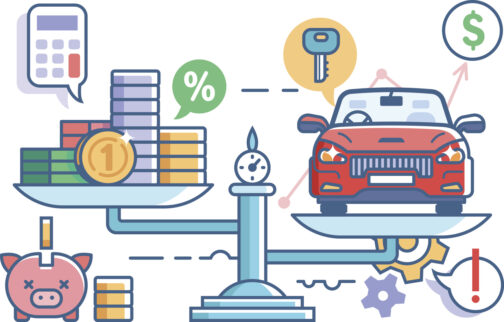by Lori Straus
No two used cars are identical. This can make comparing apples to apples difficult when you’re buying a used vehicle. So, instead of using price as your guiding factor, use value to find the right car for you.
Cost vs. Value When Buying a Car
The manufacturer and dealership decide the cost of a vehicle. Aside from some fluctuation caused by sales, dealership location, or negotiating skills, it is almost the same for each customer.
The value of a vehicle, though, differs for each customer. For some drivers, a $5,000 car that’s over 10 years old is extremely valuable because it lets them drive to work in 15 minutes instead of needing 45 minutes with public transit. For other drivers, a $45,000, 3-year-old minivan is valuable because it can safely transport a growing family around town.
When you’re buying a used car, be very clear on the value you’re looking for.
What’s Your Budget?
Knowing the value you need out of a car doesn’t mean you throw your budget out the window. Value can also include how hard your new vehicle will be on your pocketbook. If a vehicle with all the bells and whistles means you have to give up your weekly date night, you might want to reconsider your purchase.
However, as you’re setting your budget, decide how much wiggle room you have. You needn’t share this information with the sales representative at the dealership, but if a monthly car payment of $100 over what you had hoped for gets you a car that’s newer, or has better security features, or comes with higher reliability ratings, then it might be worth the extra money.
Where Will You Be Driving Your Vehicle?

You’re trying to find the right car for you, so don’t forget to evaluate your driving routine. If you do most of your driving in the city, you may value a small car that can fit into tight spaces more than a large SUV.
Do you have an hour-long daily commute? An SUV may bolster your confidence on the highway but could also eat up a lot of gas. When researching used cars for your driving situation, include mileage as one of your factors. (Remember, though: older cars won’t perform as well on mileage as newer ones.)
Who Will Be Using Your Vehicle?

As much as that used but pristine exotic car might draw your desires, if you have a spouse, three kids, and an aging parent at home, you should perhaps consider a different vehicle.
And if one of those kids is close to driving age, it really isn’t the best car purchase you could make.
On the other hand, if you’re helping your freshly minted teen driver buy their first car, they may be happy with something reliable that gets them between home, school, practice, and friends as opposed to such an expensive sports car.
(Disclaimer: I don’t have teens yet, so that last statement may not be accurate.)
Buying a Car Is About Cost and Value
You must know your budget when buying a car. Settling for something more than you can afford will only cause strain in other areas of your life. But don’t settle for a vehicle just because it’s cheap. If a cheaper vehicle has less value for you, your family, and your lifestyle than a more expensive—but still affordable!—used car, spending a tiny bit extra might be your better option.


